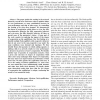Free Online Productivity Tools
i2Speak
i2Symbol
i2OCR
iTex2Img
iWeb2Print
iWeb2Shot
i2Type
iPdf2Split
iPdf2Merge
i2Bopomofo
i2Arabic
i2Style
i2Image
i2PDF
iLatex2Rtf
Sci2ools
WIOPT
2010
IEEE
2010
IEEE
Routing games : From egoism to altruism
The paper studies the routing in the network shared by several users. Each user seeks to optimize either its own performance or some combination between its own performance and that of other users, by controlling the routing of its given flow demand. We parameterize the degree of cooperation which allows to cover the fully non-cooperative behavior, the fully cooperative behavior, and even more, the fully altruistic behavior, all these as special cases of the parameter's choice. A large part of the work consists in exploring the impact of the degree of cooperation on the equilibrium. Our first finding is to identify multiple Nash equilibria with cooperative behavior that do not occur in the non-cooperative case under the same conditions (cost, demand and topology). We then identify Braess like paradox (in which adding capacity or adding a link to a network results in worse performance to all users) in presence of user's cooperation. We identify another type of paradox in coope...
| Added | 15 Feb 2011 |
| Updated | 15 Feb 2011 |
| Type | Journal |
| Year | 2010 |
| Where | WIOPT |
| Authors | Amar Prakash Azad, Eitan Altman, Rachid El Azouzi |
Comments (0)

